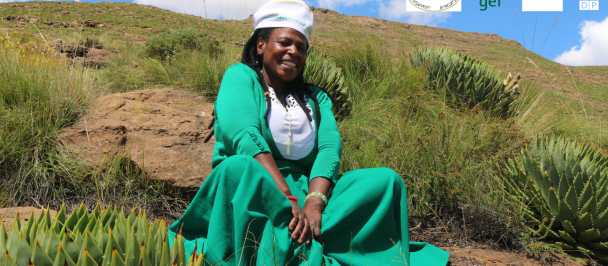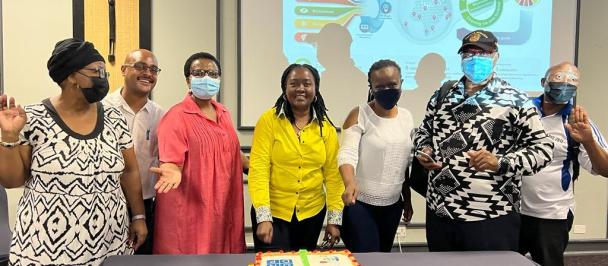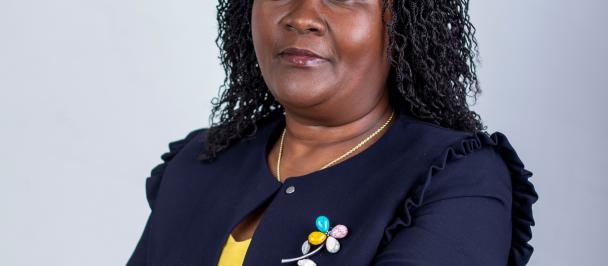Over the years women and girls have not participated in the field of science as much as their male counterparts, with females accounting for less than 30% of STEM researchers in the world [1]. There are multiple factors which hinder women from pursuing the science, technology, engineering and mathematics (STEM) field. Almost all of these are rooted in social constructs and socio-economic factors such as: lack of access to education, especially in the STEM field for women and girls; inequalities in developing countries which leave a lot of girls without access to STEM materials and equipment; teenage pregnancy and early marriages which hinder women from pursuing STEM fields, especially in the case of women in Lesotho; as well as gender stereotypes which deter women from pursuing studies in this field.
UNDP Lesotho recognises the importance of equity, a reflection of diversity and the inclusion of all human beings in their development agenda. The inclusion of women in all areas of development and industries, and especially in STEM is of paramount importance within a society which has denied women multitudes of opportunities.
To support this course, in 2020, UNDP Lesotho through the UNDP Accelerator Labs partnered with the National University of Lesotho (NUL) in their International Science, Technology and Innovation Conference and Expo (NULISTICE), an event geared towards the promotion of Science, Technology and Innovation. The expo involved a hackathon (a sprint event where programmers build new software programmes often in competition with one another), themed: “Entrepreneurship through Innovation”, which encouraged a generation of knowledge-based systems which would mitigate the problems Lesotho is grappling with such as: (1). the need for a Government Development Repository to store national policies, legal and regulatory frameworks which would assist in tracking public policy trends and provide easy access for the public; (2). Student-Industry Project Placement Platform which would align the skills of users to specific job opportunities, consequently assisting in the reduction of the high unemployment rates (22.5% in 2019)[2] in the country; (3). and a Farmer’s Mobile Application which would create a platform for farmers to network and connect with the local consumer market, in addition to receiving alerts about diseases, the weather and market analyses.
The hackathon hosted only 2% female participants, reflecting the fact that very few women take courses in technology-based disciplines which could be a symptom of gender stereotypes, inequalities and exclusions. Of the 2% female participants, one of the participants Shoeshoe Moshoeshoe detailed her experience with her team member at the hackathon;
“In my team, it was myself and another female partner who participated in the hackathon and people were shocked by this. They kept asking us ‘How come it’s only the two of you and you are both females? How come there is no male in your team?’”.
Further proving the preconceived notions which people have about women’s ability in the field of technology. Conversely, UNDP Lesotho upholds sustainable and inclusive economic growth as one of its pillars through which it supports the Government of Lesotho, Academia and other national partners to realise. With this, UNDP continues to champion the inclusion of women in every industry as well as all sustainable development initiatives. Therefore, there is a call upon us to encourage more women to participate in future hackathons. Even though there was a low participation of women in the hackathon, it was recorded that women had nearly as much shareholder stake as men in the businesses that competed at the expo, with 84% of them belonging to the youth.
These statistics reflect the need for Lesotho to change its perceptions towards female inclusion within the STEM fields, by providing opportunities for women to learn outside the classroom and including them in all initiatives geared towards STEM research and innovation. Ms. Moshoeshoe also noted that attending the hackathon was a good experience for her because she could apply what she had been learning from her lectures to real world problems which need immediate intervention. Furthermore, in order to reflect equity, diversity and inclusion of girls and women within STEM, the call is upon us all to create environments where the words spoken to little girls about their future careers are those that encourage them to pursue whatever they desire.
[1] UNESCO, “Women in Science”, accessed on 11 February 2022 http://uis.unesco.org/en/topic/women-scien.
[2] The World Bank, “The World Bank in Lesotho”, accessed on 10 Febraury 2022 https://www.worldbank.org/en/country/lesotho/overview#1.

 Locations
Locations

